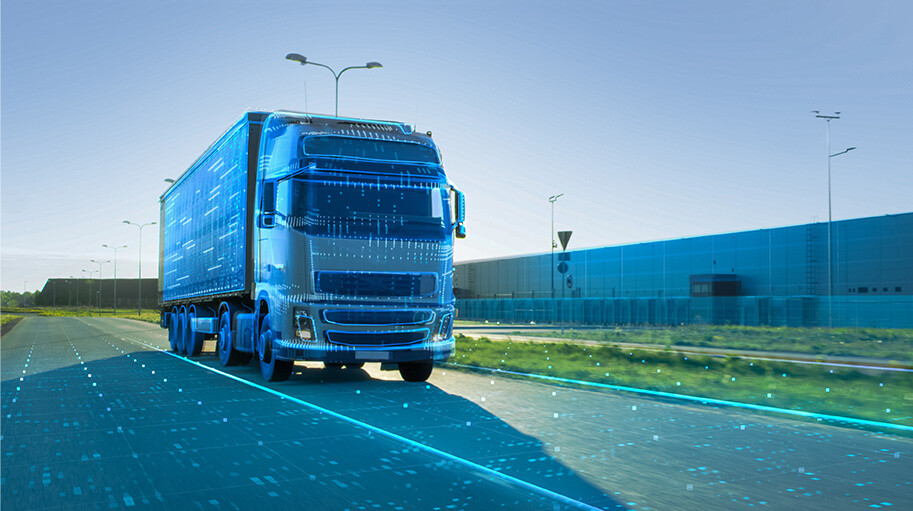
header pro vs anti autonomous copie
From myth to reality: autonomous trucks could be present on European motorways by 2030.(1) According to an ITF(2) report, the use of these trucks will allow road haulage companies to save money, reduce their carbon footprint, improve safety, increase efficiency and overcome driver shortages. But at what cost?
We asked two experts about this polarising topic. Are you for or against autonomous trucks? Here are their answers.

amelineau combes
Olivier Amelineau, Press and Media Relations Manager, Mercedes-Benz Trucks France (Daimler Truck group); François Combes, Researcher and Transport and Logistics Economist at Université Gustave Eiffel.
There are five levels of autonomy: level 1 corresponds to driver assistance while level 5 is a fully autonomous vehicle.
What level of autonomy do you think is best for a driverless truck?
Olivier Amélineau (OA): At Daimler Truck, we strongly believe in Level 4 trucks (high automation) and are currently working on this.
We already have semi-autonomous Level 2 systems (partial automation), which means the driver can let go of the steering wheel for 30 seconds and the vehicle will keep driving. You just need to regularly push on the steering wheel to show a human presence! We have chosen to shift directly from level 2 to level 4. Level 3, with conditional automation, doesn’t seem useful for trucks.
To speed up the development and marketing of Level 4 autonomous trucks, in September 2019, Daimler Truck acquired the American company Torc Robotics, which specialises in autonomous technology for land vehicles.
Daimler Truck doesn’t believe in full automation. At least that’s not the path we are taking.
"There will always be a driver in the truck"
Olivier Amelineau, Press and Media Relations Manager, Mercedes-Benz Trucks France (Daimler Truck group)
François Combes (FC): I think that autonomous trucks will only have a significant financial impact when we reach level 5 and full automation. This means without a driver and therefore without a cab, which will increase payload.
I don’t think partially automated trucks will be very profitable. What we’re really interested in, and this is a bit cynical, is a fully autonomous truck that eliminates the need for a driver.
There are three advantages to fully autonomous trucks:
- - You no longer need to pay a driver
- - You eliminate human management issues
- - And it’s easier put a truck on the road for 16 hours non-stop without a human on board to deal with
What environmental impacts will autonomous trucks have?
OA: The clearly stated goal of autonomous trucks is to generate the lowest possible environmental impact with the best possible performance!
At Daimler Truck, our automated options are intended to make life easier for drivers, improve safety, and reduce fuel consumption through eco-driving. And it’s incredibly effective!
We know that European systems – Predictive Powertrain Control – that manage the kinetic chain through its GPS, knowledge of the route topography, and the state of the truck offer immediate fuel savings of 5–7%.
FC: In the medium term, the appearance of partially or fully autonomous vehicles is likely to profoundly alter the current economic balance in terms of both supply (hauliers) and demand (shippers).
Full autonomy could profoundly reorganise road freight transport and logistics chains with an environmental impact that depends on the autonomous truck engines and the (likely significant) effects of increased traffic.
A scenario with total automation could result in more and smaller trucks on the road.
Will autonomous trucks have a social impact?
OA: Daimler Truck doesn’t think drivers will disappear. But their role will probably change to become more technological, less physical, or more focused on customer relations. Drivers will be more involved in monitoring and managing the vehicle. They will also need to analyse the truck’s data. This change in drivers’ duties could make the job more attractive, particularly to tech-savvy young people. It will therefore have a positive social impact!
FC: For fully autonomous trucks, the impact will necessarily be negative due to the loss of thousands of driving jobs.
They will save money, but not for everyone. The savings generated by automation may be absorbed by the increase in the price of autonomous vehicles.
"Widespread adoption of autonomous trucks will have a negative social and environmental impact".
François Combes, Researcher and Transport and Logistics Economist at Université Gustave Eiffel. He authored a 2019 study on autonomous trucks.(3)
So, what do think about autonomous trucks?
European regulations(4) will need to adapt quickly to harmonise the authorisation of these vehicles at the European level.

gettyimages 930571046
car going fast on a road by night




